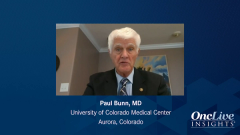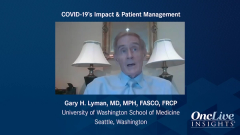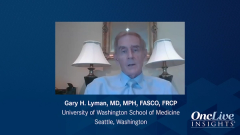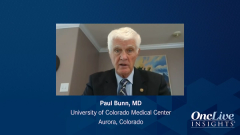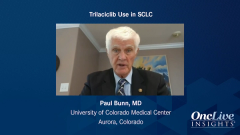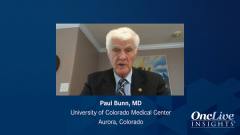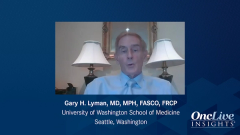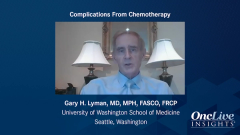
Analyses of CDK4/6 Inhibitors for Myelopreservation
Episodes in this series

Paul Bunn, MD: A major question is whether there is a way to prevent all types of myelosuppression—neutropenia, anemia, and thrombocytopenia. If we had 1 drug that could affect all lineages, that would be really helpful, rather than worrying about 3 types of growth factors and 3 separate problems. Any cell has to divide. We have factors and proteins that cause the cell cycle to progress, and we have inhibitors of cell cycle progression. In general, the cyclin-dependent kinases are stimulating cell cycle progression from G1 through S, G2, and mitosis. If we could inhibit cell cycle progression before giving chemotherapy, that would reduce the adverse effects of chemotherapy, because chemotherapy is affecting proliferating cells much more than other cells. If we could inhibit cell cycle progression at the time, or just before, we give chemotherapy, it might markedly reduce the myelosuppression from chemotherapy.
Cell cycle–dependent kinases promote cell cycle and promote growth of all bone marrow cells. Inhibiting this just before chemotherapy might markedly reduce the myelosuppression induced by chemotherapy. CDK4 and CDK6 are 2 cell cycle-dependent kinases that stimulate cell cycle growth and proliferation. If we could inhibit CDK4 and CDK6 just prior to chemotherapy administration, it might markedly reduce myelosuppression from chemotherapy. Trilaciclib is a CDK4/6 inhibitor, and it might inhibit cell cycle progression. Therefore, if given before chemotherapy, it might markedly reduce the myelosuppression of chemotherapy.
Small cell lung cancer patients frequently have all types of myelosuppression due to chemotherapy. In the first line therapy of small cell lung cancer, the standard is etoposide and carboplatin, which frequently cause myelosuppression, including anemia, thrombocytopenia, neutropenia, and febrile neutropenia. In the second-line setting, topotecan is the only approved agent. That also very frequently causes neutropenia, thrombocytopenia, and anemia. Trilaciclib, the CDK4/6 inhibitor, has been studied in patients receiving standard first-line or second-line therapy. In the first line, there were 2 studies that gave etoposide-carboplatin or etoposide-carboplatin and atezolizumab. The patients receiving these first-line therapies were randomized to receive trilaciclib or placebo. In the second-line setting, patients receiving topotecan were also randomized to receive trilaciclib or placebo.
In the pooled analyses of these studies, there was no effect on the efficacy of the chemotherapy. That is, the progression-free survival and overall survival were the same in patients receiving placebo or trilaciclib. On the other hand, there was a marked reduction in myelosuppression. Grade 3/4 neutropenia was reduced from 77% to 43%. Days of febrile neutropenia in the first cycle were reduced from 4 to none. GCSF administration was reduced from 56% to 29%. Grade 3/4 anemia decreased from 32% to 20%. Red blood cell transfusion and platelet transfusions were reduced, but because these are not as frequent, they may have been reduced less. It was clear from these 3 trials that trilaciclib would reduce myelosuppression from neutrophils, red blood cells, and platelets. The fact that this was a striking reduction led to a breakthrough designation by the FDA to review these trilaciclib myelosuppression reduction trials.
Transcript edited for clarity.


